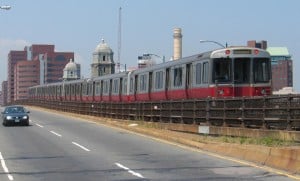The head of the Boston-area transit system promised an independent review of recent subway derailments after one during Tuesday’s morning rush caused widespread disruption for commuters.
MBTA General Manager Steve Poftak said investigators were trying to determine why the third car of a Red Line train went off the tracks at an above-ground stop near the Boston campus of the University of Massachusetts and the John F. Kennedy presidential library.
About 60 passengers were evacuated from the derailed car, authorities said. One person was treated at the scene for a hand injury and a second person, who initially left the scene, returned later complaining of neck problems and asked to be taken to a hospital, according to Poftak.
The incident came days after a crowded Green Line trolley derailed below ground near Kenmore Square, sending nine people to hospitals and requiring police and firefighters to guide passengers to safety through a darkened tunnel.
Poftak stressed there was no connection between Tuesday’s derailment and the one on Saturday. The earlier incident has been preliminarily blamed on that train’s operator, who has since been suspended.
But Poftak said he wanted a “fresh set of eyes” to examine the incidents.
“I think we have an obligation to the riding public and taxpayers to make sure we are taking every step possible to address these issues,” he said, in announcing plans for the third-party review.
There have been four derailments so far this year, Poftak said.
MBTA officials scrambled throughout the day to mitigate disruption caused by the Red Line derailment, but delays were expected to continue while crews used cranes to extricate the disabled train and repair damage to the tracks and signals.
Extra buses were deployed to shuttle passengers who normally use that stretch of the Red Line, and the MBTA also offered special commuter trains from Boston’s South Station that riders could use at no extra cost.
The recent derailments added to frustration felt by riders and local officials over the aging transit system plagued by frequent mechanical breakdowns and delays, even as users braced for an average 6 percent fare hike that takes effect July 1.
“This week’s @MBTA derailments are unacceptable,” Boston Mayor Marty Walsh said on Twitter. “We need answers, solutions & more funding, and we need it now.”
Gov. Charlie Baker has pointed to a five-year, $8.5 billion capital investment plan that he says will gradually improve MBTA service and reliability. But many advocates and lawmakers are pushing for tax increases to provide more resources for public transportation.
The state legislature on Wednesday was expected to vote on a so-called “millionaire tax” that would be paid by the state’s wealthiest residents, with the proceeds going to transportation and education. The measure requires voter approval and could not take effect for several years.







